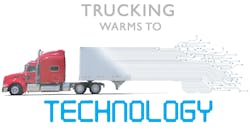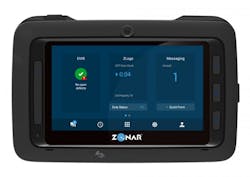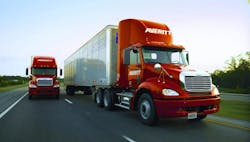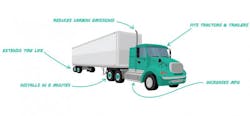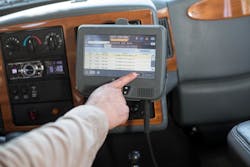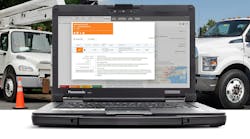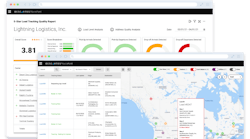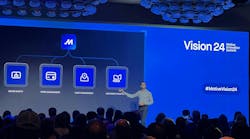Long considered a cautious industry when evaluating new technology, trucking’s reputation may be changing. Executives with fleets and technology suppliers agreed there is more growing interest as costs fall and comfort levels rise. However, an investment that does not include an implementation and training plan will not achieve all of its gains, some of which cannot be measured in precise dollars and cents.
“This is a permanent change in the way fleets look at business and manage their businesses,” said Deryk Powell, president and CEO of Velociti Inc., which specializes in the installation and service of transportation and networking technology. “Specifically, we see a lot more conversation surrounding multifaceted technology investments.
There are several contributing factors to this trend.
“Some of this is driven from new players coming into the transportation space and disrupting commerce,” Powell said. “It is forcing fleets to look at their businesses in a completely different way.”
At the same time, the upcoming electronic logging mandate is requiring investment-cautious carriers to change their thinking, and “through that process, it has opened up other conversations around other technology.”
Powell was not alone in saying the ELD mandate has triggered a larger movement.
Scott Hildebrand, vice president of support and customer experience at Omnitracs, said the regulation, scheduled to take effect in December, is leading to many first-time inquiries.
“It is an interesting nuance we are seeing this year,” Hildebrand said. Fleets are saying, “I have to be compliant, so where else can I leverage technology?”
Fleet executives, many of whom juggle multiple responsibilities, think the answer is only where “they feel enough pain.” In reality, there are usually many areas where an investment can offer monetary savings, higher productivity, and employee satisfaction.
Larry Jordan, chief product officer at Zonar Systems, agreed that new customers are saying, “I have to buy this ELD thing, so help me out.” They tend to have preconceived notions on the specific pieces of their business to invest in. That often overlooks areas like fuel management, vehicle utilization, and safety compliance, where modern technology can outperform existing processes, he said.
Amos Rogan, productivity and efficiency leader of less-than-truckload operations at Averitt Express, said as fleets consider an investment, they should ask themselves, ‘What does
being more productive look like?’
“It doesn’t always mean delivering another shipment or picking up another shipment,” he said. “Maybe we are finishing up
quicker, taking out miles that a city driver has to drive in order to get all his shipments off because we loaded the trailer better, or are routing in a more productive way. When you really get to looking at it,” he continued, “there is no one true measurement.”
In Averitt’s case, its technology investment includes not only outside vendors but building internal systems based off the IBM AS400 platform for its LTL, truckload and supply chain/dedicated units. The company employs in-house programmers to develop and maintain these systems to improve delivery times and meet shippers’ requirements.
“Our operations are all different in terms of not only what the customer expects [regarding] measuring performance and productivity,” Amos said.
Zonar’s Jordan said the benefits of a technology investment “really depend on the up-front effort that a company puts into utilizing the solution.”
Velociti’s Powell noted that it starts by bringing together a range of people whose divisions might be impacted. That could include operations, maintenance, finance, safety, and human resources.
He also cautions fleets to guard against “investment fatigue.” There can be so much effort into gaining budgetary approval and choosing a supplier that not enough effort is put into system implementation and employee training. There also should be a longer-term plan on technology upkeep to maximize ROI over the long term.
Omnitracs’ Hildebrand encourages fleets that are investing in multiple areas to be patient.
“You can’t do it all at once,” he said, suggesting, as an example, a fleet should first transition fully to e-logs from paper before moving to other telematics offerings. Likewise, he reminds them that “technology doesn’t replace bad processes.”
It is not just telematics and electronics seeing more interest from fleets. Judith Monte, vice president of marketing of Aperia Technologies Inc., maker of the Halo Tire inflation system, said, “We are starting to see some of the initial conservative feelings fall by the wayside. The technology is at the point now where it is considered tried and true.”
Monte noted tires remain a top operating expense for fleets, and proper inflation can be difficult to manage manually.
In June, Brown Integrated Logistics announced it was making Halo a standard specification on all new and existing power units. The system is self-powered and self-contained, does not require tapping or drilling of axles, and installs in under 30 minutes.
“Proper tire inflation is extremely important when running wide-base single tires,” said Brian Kinsey, Brown’s president and CEO. “We specify the Halo Tire Inflator on all of our tractors to reduce the likelihood of tire failure, optimize fuel economy, and ensure safe stopping distances.”
Kinsey said his company started testing Halo units in April 2016 on 15 tractors, but it was difficult to determine the payback because a proper evaluation period would take two years.
After the initial evaluation, Brown took “a leap of faith,” knowing there is proven science showing that keeping tires properly inflated improves fuel economy.
Combined with the expectation of longer tire life, Kinsey assumed “the device would eventually pay for itself.” Already, he said, the Halo system had paid an additional dividend. One of the tractors has used the system for less than six months picked up a “substantially sized bolt” into one of its super single tires, resulting in a leak. The Halo system kept the tire inflated long enough for that driver to arrive safely to one of Brown’s facilities for a quick repair.
“It saved me a road service call, a new tire expense, and downtime,” Kinsey said. “That one event saved me the cost from that particular tractor.”
In summing up Brown’s lengthy history of technology investments, Kinsey said the company went “with the best option at the time,” leading to long relationships with vendors, including PeopleNet and SkyBitz.
Looking at today’s marketplace, he suggested “there may be some lower cost alternatives, but it wouldn’t be lower for us if we had to re-outfit” the company’s equipment and network.
Instead, Brown takes advantage of new upgrades that are made available for its existing systems. For trailer tracking, that means converting satellite tracking units to solar power to cut into the downtime caused by dead batteries. “Trailers don’t move themselves,” he noted.
Upgrades on its in-cab navigation system tend to focus on driver retention. Using scanning software that allows drivers to submit paperwork via cell phones is translating into faster payments.
Concerns about technology investments becoming obsolete or newer offerings coming to market at lower prices are “valid,” said Omnitracs’ Hildebrand. He tells them “what we’re investing in for our customers is looking toward the future.”
Dave Riordan, chief client officer of Lytx, said fleets are “investing in a platform … that grows with you in time.”
John Lobenberg, Kroger’s safety director, suggested that for technologies such as Lytx’s DriveCam system, fleets should not worry about the technology getting stale. Instead, they should consider the alternatives to not investing, which could mean a higher exposure to a serious incident that “could put a small business out of business.”
E-commerce fuels further tech changes
For less-than-truckload and delivery fleets, Amos Rogan, productivity and efficiency leader of less-than-truckload operations at Averitt Express, believes it.
will need to rely on more technology to handle the requirements of the booming e-commerce sector. He said it is “kind of the Wild West in terms of how different companies view what will be required for final-mile delivery.”
The emergence of companies like Amazon, and countermoves from retailers such as Walmart, mean “transportation companies need to think a little bit differently about what they are doing, and how they are going to handle customer requirements,” he said.
Delivery firms need to work with the “dot.coms that are not going away because it is too easy for people not to use them.”
Currently across the supply chain, Amos said carriers are behind the discussion about shipment visibility and “how to handle final mile more than customers, who just want it delivered.” As an example, he cited cases where a 53-ft. trailer is expected to deliver a treadmill to a small residential subdivision and turn around in a cul de sac. The fleets with the best technology combining the speed, accuracy and resources to handle these tricky shipments are bound to find the most success, Rogan said.
Video systems seen as next big tech investment
Wondering what might be the next big technology investment for the trucking industry?
Fleet Owner interviews with suppliers and fleet executives suggest it will be video event recorders. In fact, John Lobenberg, safety manager at Kroger, said he believes they will likely be required for all trucks sometime in the future.
“I don’t see any downside to them, and there is huge upside on liability and safe driver behavior,” he said.
Kroger recently adopted the Lytx Drivecam video program, which combines video capture of incidents such as hard braking and swerving with data analysis. At the outset, he said Kroger was unsure of the exact return on investment other than a 35% reduction in accidents Lytx had referenced.
Within four months, Kroger saw a 50% reduction in collisions and 71% drop in handheld cell phone use, which Lobenberg called the biggest data surprise. Even more important was the outcome of a serious rollover incident involving a driver who was coached through the video system to make sure he always wore his seat belt.
“He walked away,” Lobenberg said, rather than potentially a far more tragic fate.
Lytx is one of a number of providers of video-based services. They have been credited for helping exonerate truckers who are accused of causing an accident by leaving a lane or other negligent actions. In these situations, truckers are able to provide police arriving on scene images in almost real time.
Beyond accident evidence, “video enriches everything that can be done with fleet operations,” Gretchen Griswold, senior director of corporate communications at Lytx, said.
A piece of the overall ROI equation for fleets like Kroger is that better driver behavior can improve a company’s brand and image, she noted.
